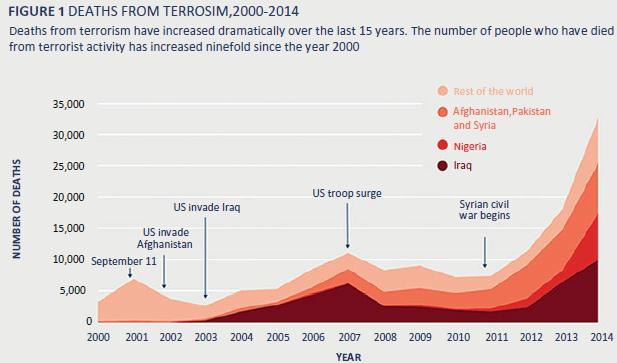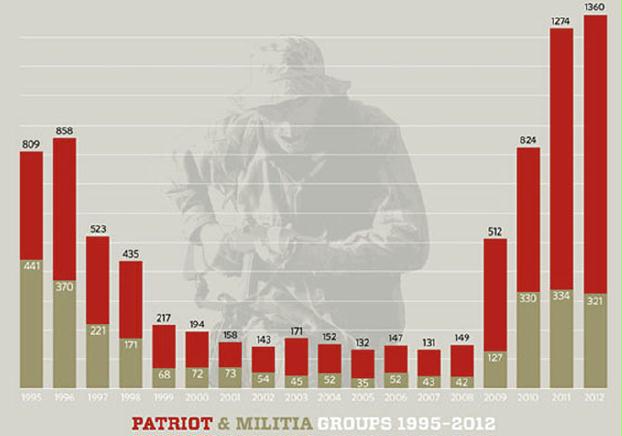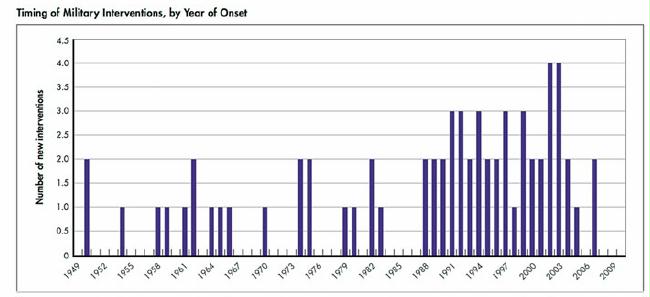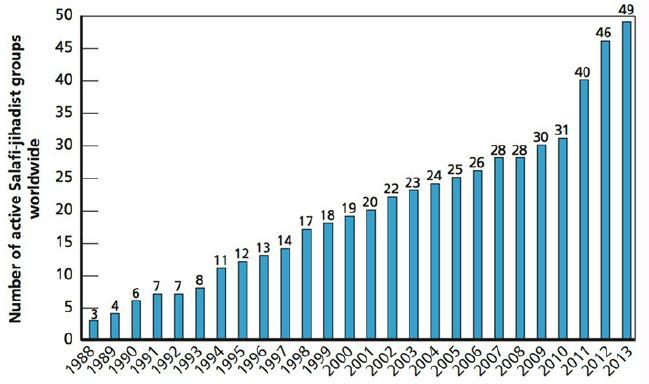
Deaths from terrorism between 2000–2014. Deaths from terrorism have increased dramatically over the last 15 years. The number of people who have died from terrorist activity has increased nine-fold since the year 2000. Source : ABC News (Australia) based on Global Terrorism Index
This post contains information from Nafeez Ahmed’s 2017 book “Failing States, Collapsing Systems BioPhysical Triggers of Political Violence“, Springer.
Alice Friedemann www.energyskeptic.com author of “When Trucks Stop Running: Energy and the Future of Transportation”, 2015, Springer and “Crunch! Whole Grain Artisan Chips and Crackers”. Podcasts: Practical Prepping, KunstlerCast 253, KunstlerCast278, Peak Prosperity , XX2 report
It appears that military planning for the war-on-terror began long before 9/11. Compelling evidence can be found in official documents, high-level government testimony, industry sources and statistical analysis.
Major interventions most often occur in strategic areas near the remaining Middle East fossil fuel resources, whether by direct, covert, or via proxy forces (Stokes and Raphael 2010).
Lately scientific studies have shown that the main reasons motivating U.S. military invasions are access to fossil fuels, mainly petroleum (Bove et al. 2015), and to force countries to open their markets to US exports (Berger et al. 2013).
Bove and Sekeris say that their research on the role of oil as a source of conflict “motivates military interventions and assistance to promote the commercial interests of the invading country, adding a dark dimension to the implications of modern societies’ dependency on oil, while also raising questions about the ethical grounds of such military interventions” (Bove and Sekeris 2016).
Attempts to control the world’s oil resources is also done to be sure economic growth continues. For example, documents from one of the US military’s most important commands, Central Command (CENTCOM), show that US military interventions have been motivated to support the ‘free market’ for decades. CENTCOM’s mission has become one of “keeping the global economy open” (Morrissey 2016).
Violence has become the main way fossil-fuel producing countries are forced and exploited by the global neoliberal capitalist order to be sure that global economic growth continues via increasing energy production.
As both EROI and social unrest destabilizes Middle Eastern countries, so have military interventions increased. A RAND report that looked at how often US military interventions occurred from 1949 to 2010 came to the startling conclusion that not only did the overall frequency of US interventions increase, but that an intervention increases the probability of an ensuing cluster of interventions, with each new intervention increasing “the likelihood of an additional intervention in the next by at least 20% and possibly as much as 50%.” The report further found that such “clustered deployments” have been “more likely since the fall of the Soviet Union than during the Cold War,” and further that the number of US interventions “increased dramatically over this period, especially between 1988 and 2004 (Fig 6.5).
Given the links between US military interventions, energy interests, and the global economy, this establishes a strong empirical case for the conclusion that escalating Western state-militarization is a direct response to the destabilization of the global system as declining EROI has weakened the foundations of the global neoliberal capitalist order, and undermined state-territorial integrity in key strategic regions, particularly across parts of the Middle East, North Africa and Central Asia which contain most of the world’s fossil fuel resources and energy transshipment routes.
Terrorism
In turn, the escalation of Western military interventionism has provoked an increase in Islamist militancy, which has further fueled far-right extremism, and further military invasions. Since the 1990s, the rise in Islamist militant groups has increased steadily, and the rate of increase has particularly accelerated in the period following the 2011 Arab Spring (Fig. 6.6 ).
There has been a parallel rise in the number of far-right extremist groups in the US, coupled with an alarming rise in terrorist attacks by far-right groups worldwide. In the US, by far the biggest threat to homeland security is from far-right extremists, and within Europe, there has been a corresponding rise in popular support for far-right political parties (Fig. 6.7).

Fig. 6.7 Rise in US far-right militant groups. Source : Salon.com based on data via Southern
Poverty Law Center
Every single one of the far-right parties gaining popularity in Europe has strong neo-Nazi connections, and mobilizes largely on an anti-Muslim platform (Ahmed 2016).
REFERENCES
Ahmed, N. 2016. At the Root of Egyptian Rage Is a Deepening Resource Crisis. Quartz. Accessed August 16. http://qz.com/116276/at-the-root-of-egyptian-rage-is-a-deepening-resource-crisis/
Berger, Daniel, William Easterly, Nathan Nunn, and Shanker Satyanath. 2013. Commercial Imperialism? Political Influence and Trade during the Cold War. American Economic Review 103(2): 863–896. doi: 10.1257/aer.103.2.863
Bove, Vincenzo, Kristian Skrede Gleditsch, and Petros G. Sekeris. 2015. ‘Oil above Water’ Economic Interdependence and Third-Party Intervention. Journal of Conflict Resolution, January 27: 0022002714567952. doi: 10.1177/0022002714567952 .
Bove, Vincenzo, and Petros G. Sekeris. 2016. Fueling Conflict: The Role of Oil in Foreign Interventions. IPI Global Observatory. Accessed July 19. https://theglobalobservatory. org/2015/03/civil-wars-oil-above-water-military-intervention/
Morrissey, John. 2016. US Central Command and Liberal Imperial Reach: Shaping the Central Region for the 21st Century. The Geographical Journal 182(1): 15–26.
Stokes, Doug, and Sam Raphael. 2010. Global Energy Security and American Hegemony. Baltimore: JHU Press. Stott, Peter. 2016. How Climate Change Affects Extreme Weather Events. Science 352(6293): 1517–1518.



One Response to Of course the reason the U.S. invades other countries for oil